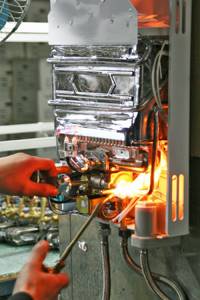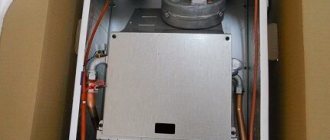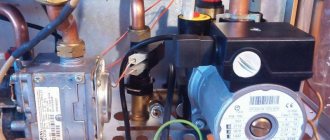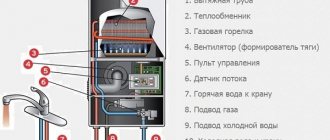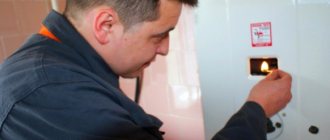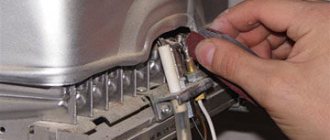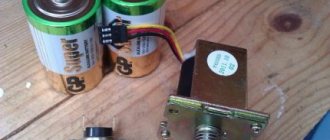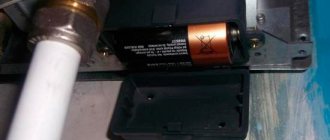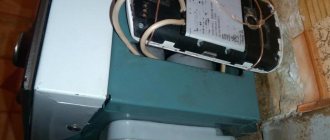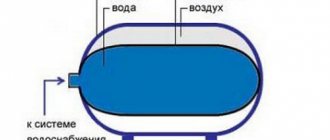Home » Heating and water supply » Gas water heaters » How to eliminate whistling, popping, and humming noises in a gas water heater
The operation of a gas water heater is always accompanied by certain sounds. Usually this is the sound of water running through pipes or the burning of a fire. But it happens that the device begins to make non-standard sounds: whistling, popping, clicking, etc. If this starts to happen, you need to quickly figure out why the gas water heater is making noise. The reasons may be different.
…
- 1 Popping sound when turned on
- 2 The speaker is noisy and buzzing
- 3 Causes of noise in a device with electric ignition
- 4 Speaker whistles
- 5 Other causes of noise
The principle of operation of the gas water heater
The column or flow heater, as it is called, is a metal box (casing). Two pipes are connected to it for supplying water and gas. The main design elements are:
- Radiator (water flows through it).
- Main and pilot burners (serve to heat the liquid in the radiator).
When the user opens the faucet, the valve opens and allows gas to flow into the burner. It lights up and the gas heats the heat exchanger. Combustion products are removed through the chimney and ventilation.
Nature of faults
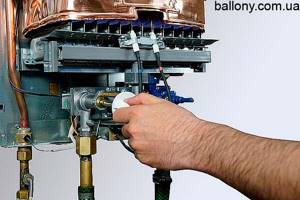
It is important to remember that the appearance of any extraneous sounds from the speaker body is always a consequence of three main reasons:
- Incorrect or untimely maintenance;
- Manufacturing defects;
- A very long service life, after which the manufacturer cannot guarantee the safe operation of the column.
In the first two cases, specialist intervention may be required, even if the issue does not concern the gas part of the equipment. Manufacturers themselves strongly recommend contacting specialized gas services if the boiler no longer meets the stated requirements, or if other factors causing concern have appeared in its operation.
In the latter case, it is recommended to immediately replace the outdated equipment with new one in order to prevent the situation from worsening, where at best the device will stop working normally, and at worst it can lead to gas contamination and an explosion. What this may be connected with and what other signs may indicate a malfunction of the gas water heater, we will consider further.
Conclusions and useful video on the topic
A video about how to troubleshoot a geyser. A detailed overview of disassembling and repairing a gas water heater at home:
In case of any type of malfunction, as a result of which the gas water heater hums and crackles, you can try to fix the breakdown yourself. But there is no guarantee that you will not damage the device. Therefore, the best option would be to contact a specialist for servicing your gas water heater.
If your speaker is still under warranty, then don’t hesitate to contact a specialist. They will eliminate the cause of the malfunction free of charge and repair or replace the necessary parts of the equipment. .
Would you like to supplement our material with useful information on eliminating the causes of excessive noise and crackling noise from a gas water heater? Or would you like to clarify a couple of diagnostic points? Ask your questions to our experts, leave comments, participate in the discussion - the feedback form is located below.
Suspicious noise in the column
Forum / Water supply / Suspicious noise in the water dispenser
Ask a question you are interested in on our forum without registration
and you will quickly receive an answer and advice from our specialists and forum visitors! Why are we so sure of this? Because we pay them for it!
Find out details
Roman31
Rating: 63
October 24, 2015 at 1:37 am
The gas water heater, already quite old, began to make noise when turned on and the water pressure at the outlet was much weaker than it was before. Input pressure is normal. This has happened before, but after a day or two everything became normal, but this time it dragged on for two weeks. What could be the reason?
Masha
Rating: 1101
October 24, 2015 at 3:07 am
Options: 1 You yourself named the reason... Weak water pressure... the inlet may be normal, but the outlet is not up to par. Talk to your neighbors, if you don’t have a station, but a main water supply, whether their pressure is normal. If not, a collective complaint to the water utility. If it is a station, check the water level and the device itself. 2 Clean the heat exchanger from scale. To do this, it is better to invite a specialist. Good luck to you!
Pavel S
Rating: 114
October 24, 2015 at 9:11 am
Don't listen to anyone's advice; noise in the speaker is a common occurrence.
Scientifically called the “cavitation phenomenon”. The same noise and crackling happens in water pipes and in... a boiling kettle. Nothing will happen to your column. Change the vinturium in the column reducer, where the membrane is located. Unscrew the water inlet pipe, there is this bronze thing with a hole a little more than two millimeters. Pull it out with pliers and put another one in, the noise will disappear.
Roman31
Rating: 63
October 25, 2015 at 4:11 am
Thank you! I'll try it, I looked specifically for something bronze, I'll try to change it myself.
How to eliminate whistling, popping, humming in a gas water heater
The operation of a gas water heater is always accompanied by certain sounds. Usually this is the sound of water running through pipes or the burning of a fire. But it happens that the device begins to make non-standard sounds: whistling, popping, clicking, etc. If this starts to happen, you need to quickly figure out why the gas water heater is making noise. The reasons may be different.
The freezer is noisy: is it a malfunction or normal?
Note that there is currently a trend towards reducing noise levels in household devices. Manufacturers are coming up with new technological solutions. Meanwhile, today there are no completely silent models. The noise level is indicated in decibels in the operating instructions.
If the equipment is noisy, but no additional signs are observed: water does not flow out, there is no burning smell, the display shows the operating temperature, no alarm signals or error codes are received, most likely, there is no need to worry!
All sounds are natural. Thus, crackling sounds are produced by elements of the cooling circuit.
Motor-compressors for refrigeration and freezer compartments
When the motor-compressor is turned on, the freezer starts and the thermostat clicks. A similar thing happens when you turn it off: a click and the motor stops humming.
The appliance is noisy when heating water
Modern boilers operate quietly, so vibration, noise, and extraneous sounds should alert you. What could be an indirect reason:
- Incorrect installation, connection.
- Incorrect setting.
- Wear of components.
There are also very specific reasons why the boiler is humming.
High oxygen content
The water in the pipes is oversaturated with oxygen, which causes bubbles to form when heated. This effect leads to increased noise and vibration not only of the device, but also of the batteries.
Air accumulation in the system
If the boiler knocks and puffs, it is necessary to bleed the air in the pipes. Modern radiators have taps installed. By unscrewing them, you can remove the accumulated air.
Scale formation
A high content of salts in water leads to their deposition on the walls of the heat exchanger. Therefore, when heated, the unit will hiss. In addition, the heating rate and heat transfer are reduced. It is recommended to clean the radiator once a year. To do this, a pump with a reagent is prepared, and the cleaning liquid is pumped through the hoses.
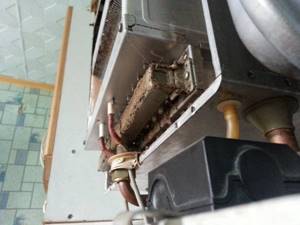
Fan problems
The fan operates in models with a closed chamber and forced removal of combustion products. Why does it make strange sounds when rotating, whistling:
The grease in the bearings has dried out due to placement above the burner. When exposed to high temperatures, the lubricant dries quickly, which leads to bearing wear. The part is disassembled and lubricated.
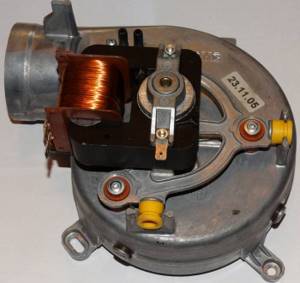
Unbalanced blades, accumulation of dirt and dust. The blades are cleaned and rotated.
Excessive pressure in the heating pump
The pump produces high pressure; its settings need to be adjusted. Too high pressure in the system can lead to an emergency. The values can be adjusted by switching the white lever on the terminal box.
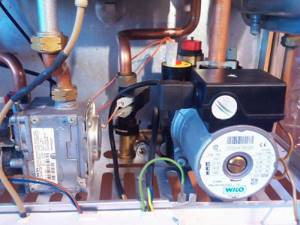
A lack of water in the system leads to serious overheating. First of all, check the thermostat settings, set them to lower values. Measure the pressure and add coolant if necessary.
And:
- If the boiler howls, it is due to an incorrect setting of the gas valve or bypass (jumper pipe).
- When operating at high power, the gas meter may rattle.
- A worn valve makes rattling sounds.
Suspicious noise in the column
One more question, if you just descale it, as advised above, what is the best way to do this, or will only replacement help?
Pavel S
Rating: 114
October 25, 2015 at 10:12 am
I was at one time when the column was the same. Soviet model filled it with concentrated hydrochloric acid. I left it for four or five hours. True, the smell was terrible. You can fill it with whey or buy anti-scale at the store. But using these means you need to keep the heater on for a day, if not more.
Roman31
Rating: 63
October 26, 2015 at 2:22 am
It's tolerable for a day, you can wait. It’s high time to replace the entire column, but as always there is no money for it, so I’m coming up with different options on how to extend its performance. I'll try the anti-scale agent and post the results.
Grekus
Rating: 48
October 27, 2015 at 10:50
The noise could come from the fact that the gas is humming when it burns, then you need to clean the jets. If the hum is reminiscent of boiling water, then most likely there is scale in the column, it is difficult to clean it off, you will need to completely disassemble the column.
The geyser goes out - why does a gas water heater light up and go out?

- Content:
- Why does the speaker go out after turning it on?
- Why does the speaker go out during operation?
- Turns off during shower mode - reasons
- Turning off the column when mixing water
- Why does the column not go out after turning off the water?
You can determine why the gas water heater goes out and fix most problems in the water heater yourself. Malfunctions are manifested in the following:
- the flame goes out immediately after switching on;
- the column goes out during operation;
- attenuation occurs when switching to the “shower” mode or mixing hot water with cold;
- the burner continues to work after turning off the water.
In each of the described cases, malfunctions are caused by different reasons.
Why does the speaker go out after turning it on?
There are several reasons for the attenuation. To determine the malfunction, you need to pay attention to the duration and intensity of the flame. The following signs will help identify the cause of malfunctions:
- The column and wick light up and immediately go out - after repeated starts, the water heater does not start. Cause of failure: failed servomotor or solenoid valve. Cleaning the burner and jets will not help. The malfunction can only be eliminated by replacing broken components.
- The burner turns off after a few seconds of operation, when turned on again the flame burns longer, after 5-6 starts the column starts working normally - the reason: a malfunction of the ignition system, more precisely the flame ionization sensor or overheating relay. To eliminate the malfunction, change the module or move it closer to the flame.
If the gas water heater turns on and immediately goes out, the breakdown can be eliminated by replacing the servo drive, solenoid valve or flame ionization sensor. Repair work requires the involvement of a specialist.
Why does the speaker go out during operation?
Another common malfunction is that the flame does not die out immediately, but after several minutes of operation. When figuring out the cause of the malfunction, you should pay attention to the following signs:
- duration of operation after switching on;
- whether the malfunction is eliminated when the water heater is restarted.
The main reasons that a geyser goes out during operation:
- The chimney is clogged - combustion products have time to escape from the combustion chamber. A characteristic manifestation: the igniter and burner go out. The speaker turns on with a bang. Troubleshooting: cleaning and restoring the smoke channel.
- The supply and exhaust ventilation and the gas heater in the kitchen are turned on at the same time - while the water heater is operating, the hood must be turned off or set to a lower power. Burner extinction occurs due to the accumulation of flue gases, which cannot escape into the channel due to insufficient draft. The speaker turns off automatically after a short period of operation.
- The overheating sensor in a gas water heater is triggered - the block consists of two metal plates that are triggered when heated. The reason for the shutdown is the oxidation of the contacts between the control module and the fuse. You can check the temperature sensor by moving it closer to the burner. If this is the reason, the column will begin to work temporarily without failures. Protection against overheating of the geyser is an important part of the internal structure. It is prohibited to turn off and start the water heater without a module.
- The radiator is clogged - the heat exchanger has fins. When using the speaker for a long time, debris accumulates between the plates. A characteristic sign of a clogged heat exchanger is a change in the color of the flame to yellow. The problem can be resolved by washing the coil with warm water. At the same time, clean the igniter using a wire or a brush with coarse bristles. Spontaneous shutdown during operation should stop.
- In models with piezo ignition, it is important that the wick is constantly burning. If there is insufficient draft (the reasons are given in points 1 and 2), the igniter goes out, which leads to the column turning off.
After eliminating the described disturbances related to air circulation in the room and the need for good draft, as well as replacing the overheating sensor, the water heater will continue to function normally. The speaker will stop turning off regardless of the duration of operation.
Turns off during shower mode - reasons
The automatic column works as follows:
- a gearbox is used as a trigger, internally divided into two parts by a membrane;
- the first section is connected to the hot water supply - after filling the block, water enters the coil located above the burner device;
- in the second part there is a rod that opens the gas supply;
- water entering the gearbox presses on the rubber gasket;
- the membrane presses on the rod and opens the flow of gas.
When switching to a shower, the pressure in the DHW decreases. When the water pressure is low, the column turns off. Installing a special pump that stabilizes the pressure in the water supply pipeline will help solve the problem. You can additionally check the condition of the mixer. The burner may turn off due to debris accumulation in the shower head.
Turning off the column when mixing water
The instructions for the water heater indicate that it is extremely undesirable to dilute the hot water supplied by the water heater with cold water. It is recommended to immediately set a comfortable heating temperature. The geyser goes out when cold water is turned on due to decreased pressure in the pipeline. Inside the water heater there is a protection system (water unit) that prevents water from overheating. When the water pressure is low, the gas supply is turned off and the flame goes out.
If this happens at normal pressure, it is necessary to change the gasket of the gearbox (water unit). Membrane wear occurs due to long-term operation of the water heater. The gasket may lose elasticity due to poor water quality.
There are two ways to solve the problem:
- replace the membrane;
- Initially set the required water temperature that is comfortable for washing.
Proper operation of the water heater will help solve the problem associated with shutting down when mixing hot and cold water.
Why does the column not go out after turning off the water?
Another common problem. The cause of the malfunction is the low quality of water entering the column and the resulting disturbances:
- The rod in the water unit (gearbox) gets stuck - the reason: the appearance of rust, as well as the weakening of the spring that returns the device to its original position after turning off the water. If the geyser does not go out after turning off the water, within just a few minutes the liquid will reach the boiling point and rupture the heat exchanger tubes.
- Damage to control valves - the water heater has a valve that opens the gas supply to the burner. The unit turns on and off simultaneously with the opening/closing of the water tap. After the valve fails, gas is supplied to the burner continuously. When the hot water tap is closed, the regulator does not operate. It is necessary to completely shut off the gas supply and call a technician.
If the gas water heater does not go out when the water is turned off, you should not try to repair it yourself. The breakdown requires a qualified technician to fix it. avtonomnoeteplo.ru
Why does the speaker crack and click?
Clicking and crackling noises are another common malfunction of gas instantaneous water heating equipment. Failure occurs in both automatic and semi-automatic boilers. Below is the nature of the sounds and what exactly can cause them:
- The gas heater clicks, but does not ignite - the contacts on the ignition unit have oxidized. The module cannot be disassembled and requires replacement. The catalyst for the geyser crackling but not igniting can be dead batteries.
The gas water heater clicks after turning off the water - the “frog” water regulator has failed. Inside the block there is a rod with legs connected to the ignition block. After turning off the water, the metal rod should be returned to its original position by a spring. If the stem is rusty, it may become stuck. The ignition unit remains switched on and continues to produce a spark. For this reason, the speaker crackles after switching on. The malfunction can be caused by a coarsened frog membrane - it needs to be replaced.
The presence of a gas water heater in a house or apartment solves the issue of hot water supply. It is easy to use and, as a rule, does not cause problems for users. Therefore, the situation when a water heating device clicks, whistles, or crackles is, to put it mildly, unpleasant, don’t you agree? But what to do in this case?
In this article we will look at the main reasons why a gas water heater hums and also makes other extraneous sounds. Let's talk about when it is necessary to immediately call a specialist, and in what cases you can restore the operation of the device yourself.
Reason 2 - Batteries are dead
If you have an automatic heater that lights up when you turn on the water (for example, Vector JSD 20-W), then the reason that the water heater makes a noise when you turn on the water may be dead batteries.
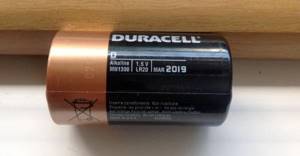
If the batteries are low, there is not enough electricity to quickly create a spark for ignition. In this case, the cracking sound is longer. During the time until the flame ignites, too much fuel has accumulated in the work area.
The batteries should be replaced with new ones. You should purchase expensive alkaloid models from popular manufacturers.
Why does the geyser turn off after a few minutes: reasons, problems
Each individual situation is considered individually, taking into account the time and activity of operation of the equipment, as well as the model.
If you were unable to determine the problem yourself, but the clicking does not stop, contact a competent technician immediately.
The situation is as follows: when you open a hot water tap, the flame does not light up for 4 seconds, and then there is a strong bang. The flame ionization sensor does not work. Previously, when there was no flame for three seconds, the gas supply to the burner stopped. This rarely happens.
In this article we will talk about malfunctions of Neva speakers (models 4510, 4511, 4513, 4510M, 4513M, 4610, 5611). Many Chinese speakers, for example, Vecktor or Oasis, and not only Chinese ones, work on the same principle as the Neva, so the solutions below apply to them as well. But please be more careful, the photographs in the article show details specifically for the Neva speakers.
Failure of a geyser can be associated both with external factors (for example, mechanical damage) and with malfunctions of individual components of the column. The most common problem faced by owners of gas water heating equipment is the failure of the device to work when the water is turned on. Why doesn't the speaker turn on? There may be several reasons.
Causes of noise
Due to the very principle of operation of the equipment, you can hear a slight noise, it crackles. Sounds may be amplified if the room is not well ventilated. There's nothing wrong with that.
Does the appliance make sounds when turning on hot water or heating? When drawing water, you may feel vibration because the flow passes through the pipes, turns, and passes through obstacles. To reduce the noise level, you can adjust the water handle. While scrolling it, listen: as soon as the sound vibrations decrease, leave it in this position.
There is a popping sound when starting up
Do you start the equipment and hear a pop? Does the device jerk and vibrate? This means there are problems with the gas supply. When starting, fuel accumulates in the working part: when the amount of air or gas corresponds to the norm, no popping noises should be heard.
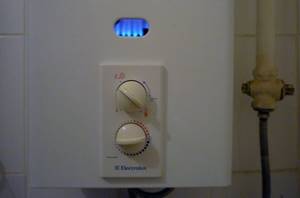
Excessive gas results in a volumetric explosion when the fuel hits the wall at the bend. This can happen if there is excess pressure in the system.
Such problems can even lead to the failure of the chimney. Therefore, contact a service center or try to fix them yourself.
- Turn off the gas and water supplies.
- Remove the equipment casing: pull the handle towards you, unscrew the two screws.
- Inspect the fuel supply system and burner. Clean the parts from dirt. How to clean a gas water heater, read the previous article.
- Unscrew the two burner tongue screws.
- Inspect the condition of the nozzle. If it is clogged, clean it.
The speaker hummed and made noise
The main reason is poor traction . To test it, light a match and hold it near the hole. If the flame deviates to the side, as if from an air flow, the draft is fine. If not, the chimney channel is clogged with soot and carbon deposits, which are produced during the combustion process. Need to clean it up.
Poor ventilation also contributes to increased noise. This often happens after installing plastic windows. The bags are so sealed that natural ventilation becomes impossible.
What to do if the device cracks? This is possible when the burner nozzle (nozzle) is clogged . You need to disassemble them as described above and clean them.
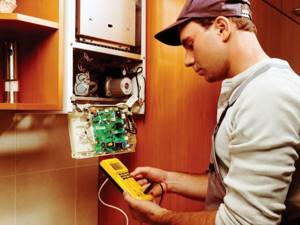
If your column is turned on by electric ignition, the reasons may be:
- Such devices operate on batteries. When they are discharged, the fuel ignites poorly or does not ignite at all. Clicking sounds may be heard. In this case, replace the batteries.
- The flow control sensor is faulty. Most often, its contacts oxidize under the influence of moisture. You can try to clean the contacts, but it is better to replace the sensor.
- The spark does not ignite. The candle that is responsible for the fire has moved, so the process does not complete. Reinstall the spark plug and resume the process.
- The ignition retarder does not work. Remove the part and shake. In this case, you should hear the noise of the ball rolling in the housing. If you don't hear anything, the ball is stuck or dislodged. Put it back in place with wire.
Is the new equipment rattling? Perhaps the reason is not the boiler, but an installation error. To find out, inspect all connections to ensure they are connected correctly. It could also be:
- Depressurization of the air duct . Air enters not only through the main hole, but also through the hole. Therefore the noise increases.
- Incorrect burner placement . Perhaps it has shifted and cannot cope with burning the entire volume of gas. You need to install it in place.
Gas boiler whistles
If the product whistles and squeaks, you need to find out where the sound is coming from. What to do:
- Turn off the gas supply.
- Open the mixer in the “hot” position.
- Did the whistling intensify? This means that the problems lie in the water path. The main reason is scale deposits on the heat exchanger parts or pipes, or blockage. It is necessary to clean all the elements in order to restore the performance of the equipment and eliminate the cause of the whistling. Using a reverse flow of water can clear clogged pipes.
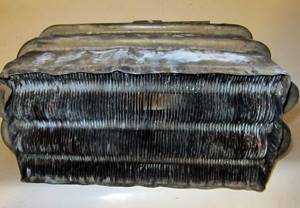
- If the whistling sound disappears when you open the tap, the problem is in the gas path. There is probably a defect in the valve that controls the flame intensity. Whistling may appear when the operating power is increased. Try turning the control until the sound goes away. Does not help? Then the problem is that the tract is clogged. The device needs to be disassembled and cleaned.
If you notice similar problems in your equipment, you can try to solve the problems yourself. But it is better to contact a service center, especially with a valid warranty card. Employees will repair or remove faulty equipment.
Popping sound when turned on
If you hear a pop when you turn it on, this indicates a problem with the gas supply. Each device has a working area in which fuel accumulates when the equipment is turned on, as well as its connection to air. If the volume of accumulated gas coincides with the manufacturer’s calculations, then there will be no extraneous pops. And if gas and air accumulate in excess, this leads to a small explosion accompanied by a loud bang. This action not only produces an unpleasant loud sound, but also increases the risk of damaging the chimney. You can solve the problem by calling a technician to your home or by yourself if you understand the design of the device. You can fix a geyser with your own hands like this:
- turn off water and gas;
- remove the body;
- inspect the gas pipeline approaching the burner;
- if necessary, clean parts from soot and soot;
- inspect the condition of the injectors; if there is contamination, clean the elements.
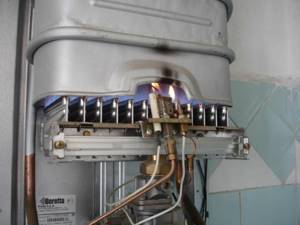
Why are the pipes humming?
The first step is to determine the source of the noise, since it can be produced by any piece of plumbing equipment. Namely:
- tap or valve at the entrance to the apartment;
- a tap or valve in the basement that shuts off the water to your riser;
- shut-off valves for the toilet cistern;
- bathroom or kitchen faucet;
- shower switch;
- geyser;
- electric water heater.
In addition to the equipment listed above, the pipes themselves can also hum; this is usually associated with an area that has a narrowing inside
Narrowing can occur due to a torn, worn-out gasket of the shut-off valves, stuck somewhere in a branch (corner) or in a tee.
Or it may appear as a result of rust growth along the weld seam; by the way, if the weld joint is not made well, then this increases the risk of such a problem. This reason is relevant if the hum appears on an already “old”, established water supply system, so to speak “out of the blue.” this."
The way to fix the problem in this case is to replace the water pipe, or part of it, or to clean the clogged section of the pipe.
It is necessary to contact specialists who have a leak detector tool. With the help of which the location of the strongest noise source is established, this location is accordingly narrowed.
If the water supply system was replaced and after that a hum appeared, the root cause was failure to follow the direction when installing the valve, either in the basement or at the entrance to the apartment.
The reason may also be a poor quality welded joint.
Or one of the sections was “knocked out” by detached scale, which “flew” when the water suddenly opened after a shutdown on the riser or the house. Eliminate the cause, as in the case described above, and if the direction of the valve is not observed, then set the necessary one.
Valves (taps) may emit a hum if the gasket is worn out, or the valve is not properly secured; again, it may be “damaged” by scale
It is not difficult to fix this, but it is necessary to turn off the water to the riser, only then unscrew the tap and valve axle box, secure the valve well, replace the gasket if necessary, and clean it from scale.
The toilet cistern may be humming, or more precisely, its shut-off valve - a valve or membrane
It can be eliminated by replacing the rubber gasket on the valve or membrane with a more rigid one. You can install a washer under the membrane, which will also eliminate the hum. Proceed with work only after making sure the water is turned off.
The mixer may be humming
It doesn’t matter whether it’s in the kitchen or the one in the bathroom: inspect the condition of the gaskets on the faucet axle boxes, and, as in the case of valves, the condition of the valve fasteners. Inspect or replace if necessary.
Here it is necessary to take into account that ceramic valve axle boxes can also emit a hum; they cannot be repaired, so only replacement is appropriate.
Advice: after turning off the water at the inlet, unscrew the ceramic faucet and take it with you to a specialized store, since the selection is very wide, and visual selection will save you from unnecessary trips.
The shower switch can also easily make a hum, or even a crackling sound.
The method of elimination is not particularly different from the others - unscrew, inspect, and, if possible, inspect by replacing rubber parts or replacing the entire element. I’ll make a reservation that this element is not so easy to find, but it’s still worth looking for, since it’s much cheaper than replacing the entire faucet. As in the case of a ceramic axle box , take it to the store, only together with this element, so that it is possible to visually compare.
Gas water heaters in the closet
A water heater is a bulky and ugly item. It stands out from the interior; you want to hide it out of sight. In this case, in the kitchen you can close it in the kitchen cabinet, but there are a number of safety requirements. First of all, the position of the column in the cabinet depends on the type of fuel combustion in the chamber - open or closed. Whatever the type of combustion, you must first provide the gas service with an installation project and obtain official permission to carry out the work.
- Open type. It is more dangerous and requires more attention. Place such a column in a cabinet without top and bottom (false cabinet). The distance to the side walls should be at least 15 cm. It is advisable to make the facade of the cabinet lattice for good ventilation. Cover the inside with a fire-resistant coating or make the cabinet walls from non-combustible material.
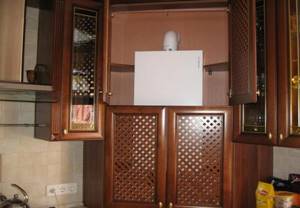
Closed type. More secure, does not require large investments. This water heater is built into a regular cabinet with a top and a bottom. Closed with a simple door without bars. The distance to the walls is reduced to 3 cm.
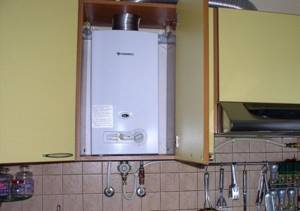
If all rules and regulations are observed, the gas water heater in the kitchen will not pose a threat and will remain in service.
Causes of extraneous sounds
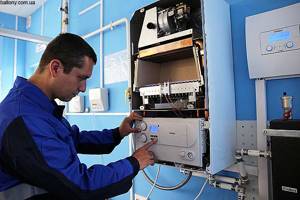
But can a gas water heater explode? Let us immediately answer that in new, mandatory certified equipment, such an outcome is completely excluded. But a number of malfunctions may appear after 7-10 years of operation. What to do? There is a way out:
- A hum in the operation of the column when hot water is opened can be caused by fouling of the heat exchanger with salt deposits. Due to the formation of overheating zones, multiple collapses of steam bubbles develop into a long and drawn-out hum. After cleaning the system, the problem should disappear;
- When the gas heater clicks after being turned on, everything indicates that the batteries in the pilot burner are low and the current is not enough to ignite. Therefore, clicks are heard for quite a long time, but ignition does not occur, or occurs with a great delay;
- In this case, popping noises may be heard, which ignites the gas accumulated in the combustion zone. Excess gas can even tear down the chimney. The automatic column will not allow you to create a larger explosion. Other problems with the gas supply may also be the cause;
- The column is noisy and as the flame intensity increases, the noise intensifies - a typical problem with a lack of air for combustion. Either a clogged ventilation duct or a faulty system fan is to blame;
- When the device vibrates, the situation can be corrected by fine-tuning the cold water supply or eliminating problems with the gas supply, which is also a common cause of vibration.
Do not be afraid to inspect the equipment for malfunctions; often the cause of extraneous sounds can be detected by ear, but often the help of a professional from a specialized company may be required to eliminate the malfunction.
The speaker hums and makes noise during operation
The cause of noise when heating water is insufficient draft. Therefore, in noisy equipment, it is the first thing to check. A lit match or lighter is brought to the control holes or a special hatch in the upper part of the column. If the flame deviates towards the device, the draft is sufficient. Otherwise, care should be taken to clean the chimney duct.
Also, noise can be caused by insufficient air flow into the room, for example, if plastic windows are installed in the kitchen. The seals in such windows interfere with the natural ventilation of the room. In this case, to eliminate noise, you should simply control the air flow.
Another reason the column is too noisy is that the pilot burner wick is dirty. And then to eliminate the noise, it is enough to clean the jets. A similar situation is possible if the jets in the main burner are clogged, then after cleaning it, the hum during operation of the column disappears.
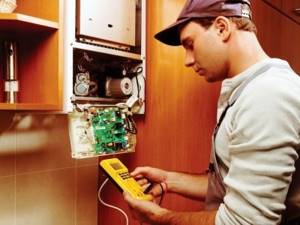
In modern speakers that are turned on using electric ignition, the cause of noise during operation may be as follows:
- Discharged batteries. As a result, the gas-air mixture is difficult to ignite. In such a situation, the batteries need to be replaced.
- Damage to the sensor that controls the water supply. Often its malfunction is caused by oxidation of the contact group. Usually this sensor is not removable, so it is replaced.
- A spark plug malfunction prevents an electric spark from being produced. Most often, it shifts after many heating-cooling cycles. By returning the spark plug to its nominal position, you will restore the possibility of spark formation and eliminate extraneous noise.
- Problem with mechanical ignition retarder. Its presence can be determined after dismantling the assembly and shaking it - normally you should hear the noise of the ball moving inside the moderator. If there is no sound, this indicates that the ball is moving. You can return it to its place using a soft wire.
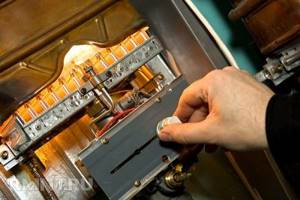
Responsibility for unauthorized replacement
It should be remembered that replacing a boiler, water heater and other gas appliances in an apartment in a multi-storey building or in the private sector should only be carried out by qualified employees who have official permission to perform work with gas and gas equipment. You can also contact specialists from the state gas service. Self-repair or connection of equipment is not prohibited by law, but it is necessary to understand the full responsibility of such actions.
If you independently interfere with the gas supply system and tap into it without permission from the gas service, you will bear full responsibility in accordance with Federal Law No. 229-FZ adopted in 2021 “On amendments to Article 215.3 of the Criminal Procedure Code of the Russian Federation and Articles 150 and 151 of the Code of Criminal Procedure of the Russian Federation” .
There is a fine for such violations of up to 80 thousand rubles. Also, the violator may be punished by performing correctional labor for up to 360 hours. The offender can also be sent to correctional labor for up to one year.
In addition, they may be sentenced to restriction of freedom or complete deprivation of freedom for 2 years. In the event that after an independent intervention in the gas system, an accident occurs, as a result of which people were injured. Then the violator will be punished with the same fine, correctional labor for up to five years, and even imprisonment for up to 8 years.
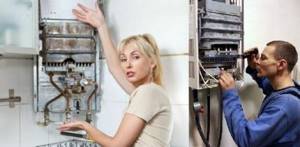
If you do not have the opportunity to carry out repairs yourself, then contact a specialist; do not forget that working with gas is very dangerous not only for you, but also for the people around you
To replace gas equipment, you must have a special permit. If an accident occurs and people are injured, the culprit will suffer administrative punishment upon initial prosecution, in accordance with Article 7.19 of the Code of Administrative Offenses of the Russian Federation in the form of a fine.
If a violation is detected again by the same person, the violator will be prosecuted in accordance with the adopted Federal Law No. 229-FZ “On amendments to Article 215.3 of the Criminal Code of the Russian Federation (CC RF) and Articles 150 and 151 of the Criminal Procedure Code of the Russian Federation (CCP RF)".
The most common causes of breakdowns
We will consider breakdowns using the example of simple Oasis and Neva units.
The design of these devices is not complicated, so any man who has the skills to work with tools can repair them.
Let's consider a number of possible malfunctions and reasons why the gas water heater does not ignite:
- lack of traction;
- water pressure is too weak;
- insufficient gas pressure;
- the ignition system has stopped functioning;
- the hot water supply pipes or filter are clogged;
- the burner is clogged;
- problems occurred with the membrane or gas block;
- inaccurate mixing of cold water in the mixer;
- faulty electronics or sensors.
Traction disorder
If there is no draft, then the gas water heater will not ignite and users will have to forget about hot water. Many dispensers are equipped with draft sensors, and if their readings indicate insufficient draft, then ignition will not be possible.
If the gas water heater does not ignite well, or the flame ignites and immediately goes out, this is due to the fact that the combustion products do not find an outlet and remain in the combustion chamber, and the flame goes out due to lack of oxygen.
In such a situation, it will be necessary to inspect the flue gas collector and the chimney itself. If blockages are present, they can become an obstacle to the normal passage of combustion products. The column perceives this as a lack of traction and does not allow the gas to ignite (or it goes out immediately after switching on). You can independently check only a certain section of the chimney, which is visible before entering the wall - subsequent work should be carried out by specialists.
The problem is related to water pressure
If your gas water heater does not light up and there are no problems with draft, then the possible cause of the problem is the water supply. A small pressure very often becomes the reason that the ignition does not work.
You can try to adjust the pressure on the column itself using the appropriate regulator - sometimes such manipulations lead to success. In addition, you need to check the filter, which is located at the entrance to the column - it could be clogged.
If there is no pressure even in a cold water tap, then all that remains to be done is to write a statement to the authorities that are responsible for water supply - the pressure must correspond to the standards set in the country. If no one is going to solve this problem, then you need to install a pump that increases the pressure - it will increase the pressure to the required standard and help ignite the gas in the column.
You can check the pipes passing through your apartment/house. It is possible that they are clogged or rusty.
Insufficient gas pressure
If the gas water heater stops igniting, the reason may be due to insufficient gas pressure in the line itself. In order to verify this, you need to light the gas stove - and if the gas pressure is very low, then you need to call the gas service and file a complaint. It will not be possible to carry out repairs yourself in such a situation, since such problems can only be solved by specialists.
Problems with ignition
There are often situations when there is a gas supply, there are no problems with draft, the pressure is normal, but the gas water heater refuses to ignite. If we are talking about a Neva or Oasis gas water heater with electric ignition, then you need to listen to understand whether there is a spark generation.

Column ignition malfunction
The fact that a spark is present will be indicated by the crackling sound that occurs when the tap is opened. If you hear a crackling sound, but the gas heater refuses to ignite, then you can try changing the batteries. Very often there is no ignition for precisely this reason.
If you are the owner of a gas water heater with piezoelectric ignition, then make sure that the igniter is working properly. If it lights up, then the column should light up overnight. If there is no flame visible, you can try to ignite it using the ignition button. If the gas in the igniter does not ignite, then the nozzle is probably clogged. You will need to clean it. To perform this procedure, it is necessary to disassemble the equipment, find the fuse and clean it with steel wire.
It is important to be very careful when repairing a geyser. It is imperative to shut off the gas supply before carrying out any operations.
As for hydrodynamic ignition, it is a symbiosis of a small generator and an electrical circuit that generates a spark and powers other electronic elements. If there is a breakdown of the generator or electrical circuit, then of course the gas water heater will not ignite. You can carry out repairs in such a situation yourself only if you have sufficient experience and relevant knowledge.
Problem with clogs
Very often, filters are installed at the entrance to the gas water heater, which remove small impurities from the water. This is where salts settle, which impede the normal movement of the liquid. All this leads to the fact that the water heater stops lighting and, accordingly, all households are left without hot water. To solve the problem, you need to turn off the water supply, unscrew the filter and clean it. If the condition of the filter is critical, it will be easier to replace it.
You can find out more about how to clean the column from scale, soot and soot here
In addition, clogging can occur in the pipes and heat exchanger. Here you need to check the permeability of the water unit and make sure that the heat exchanger is permeable. Blockages can be removed by washing with special reagents, which can be purchased at any hardware store. After this procedure is completed, the functionality of the gas water heater will be restored.
In order to avoid the appearance of deposits on the inner surface of the column, you need to install a filter at its inlet that will remove small impurities from the water and soften it.
Removing burner blockage
We have to admit the fact that the burners in the Neva and Oasis gas water heaters are subject to blockages. This often happens in models with piezoelectric ignition. Blockages appear due to the accumulation of soot. It must be removed; to do this, you will have to disassemble the column and remove the burner. You can clean it with any available tools. After cleaning, the burner must be returned to its place and its functionality checked. If necessary, you can immediately clean the heat exchanger, because its clogging causes weak traction and poor heating.
If your gas water heater does not light and you decide to clean it, then this procedure is best performed outside, or at least on the balcony. If you clean it at home, the soot flying into the air will definitely stain your furniture and walls.
Gas block and membrane repair
There are cases when a geyser does not ignite due to damage to the membrane - it responds to water pressure and controls subsequent ignition. If this part breaks, then the further operation of the gas water heater will be simply impossible.
More information on how to replace the water unit membrane.
Difficulties in repair are due to the fact that it is difficult to find a suitable membrane - you rarely see them on sale, and they are quite expensive. In addition to the membrane, it is necessary to check the entire gas block, since there are a large number of parts that can break.
In order to disassemble the gas block and repair it, you can use the instructions, of which there are many on the World Wide Web today.
Mixing cold water in the mixer
Most users, instead of adjusting the degree of heating on the gas water heater itself, begin to torment the mixer. If you make the pressure of cold water too powerful, the lit column will simply go out. If at that moment it was not burning, then there is no question that it will catch fire. That is why you first need to turn on the hot water supply, and only then turn on the cold water supply. Better yet, adjust the degree of heating using the appropriate regulators.
Also, do not forget that intensive mixing of cold water is not welcomed by the developers of geysers, because... it may damage them.
Electronics malfunction
Modern geysers are equipped with a large number of electronic units and sensors - only the simplest models lack them.
The sensors are responsible for controlling draft and the presence of flame (ionization control), monitoring the water temperature and automatically adjusting the degree of its heating. If a failure occurs with one of the transmitters, the gas water heater will no longer function fully, with periodic malfunctions.
Users note that most often the draft sensor in the exhaust gas manifold breaks down, which ultimately leads to the fact that the electronics do not allow ignition.
Failures can also be associated with electronic modules, which are present in many geysers. Repairing them is not easy because you need to have the appropriate knowledge and skills. It is best to contact specialists in such a situation.
The speaker whistles
If a gas water heater whistles, you should immediately figure out which unit the noise is coming from. To check this, turn off the gas tap, and then unscrew the hot water tap. Subsequent actions depend on the nature of the noise:
- If after the above steps a whistle appears, then it is associated with the water path. The most common cause is scale deposits in the heat exchanger or a foreign object getting inside the pipe. As a result, the performance of the device decreases. In this case, cleaning or washing the object out of the pipes using reverse flow will help eliminate noise and increase the performance of the column.
- If the dispenser begins to operate quietly, it means that one of the gas supply units has failed. This is mainly due to a defect in the valve that regulates the power of the fire. A sign of problems with the valve will be a change in sound when adjusting the flame intensity. The problem may also be hidden in a clogged tract. The whistle is then audible in any case. It is recommended to call a specialist to identify the location of the blockage.
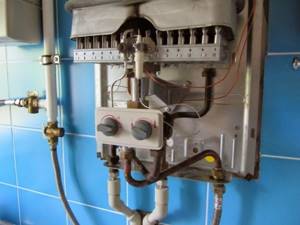
The speaker is noisy and buzzing
If the gas water heater is noisy, then most likely the reason is:
- poor traction;
- lack of ventilation;
- wick contamination.
The cause of noise when heating water is often a lack of draft . Therefore, if the gas water heater makes noise during operation, first of all check the presence of draft in the chimney. This can be easily determined by using a lit match or lighter, which is brought to the inspection hole of the chimney or its hatch:
- if the flame is drawn into the chimney, then there is draft;
- if the fire does not move, there is no draft.
If there is no draft, the chimney should be cleaned. During operation, it becomes clogged with soot and debris.
…
The gas water heater is leaking - causes and ways to eliminate them
Read here Geyser does not work - what to do
Where to go if the gas water heater is broken
Lack of air in the room can cause noise . Most often this happens if the owners replaced the old frames with plastic ones. Their seals interfere with natural ventilation in the room. In this case, to stop the noise, it is necessary to increase the air flow.
Another common cause of excessive noise is a clogged pilot wick. In this case, to eliminate the sounds, it is enough to simply clean the jets in the main burner device. Then the hum problem will be solved.
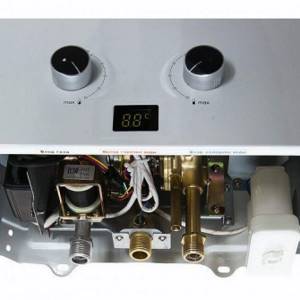
…
Battery check
In dispensers that ignite automatically when water is supplied, the delayed appearance of a spark may be affected by discharged batteries. If there is a delay of several seconds, too much air-gas mixture is formed in the combustion zone. Use a multimeter to check the condition of the batteries.
Solution: If the discharge is severe, replace the batteries.
Checking the nozzle supplying gas to the combustion zone
In columns with piezo ignition, if the nozzle (nozzle) is clogged, gas may occasionally be supplied to the combustion zone and the wick will light up irregularly. The nozzle hole can only be cleaned with thin copper wire. Take it from stranded copper wire for electrical wiring.
Jet
The second reason is the incorrect location of the nozzle (gas injector). It may be too far from the burner.
Cleaning the main burner from blockages
One of the reasons for poor performance of a gas water heater may be a clogged main burner. To get to it, remove the protective cover. The nozzle can be cleaned without unscrewing it.
Heat exchanger clogged with soot
Tips: to avoid poor performance of a gas water heater, we advise you to carry out maintenance of not only the wick, but also all the nozzles every few years, by calling a city gas mechanic to your home.
Why does a gas water heater ignite late?
One of the reasons for the appearance of popping noises when igniting a gas water heater may be the delayed or irregular appearance of a spark in gas water heaters with automatic ignition.
If an electronic traction control system is installed in the automatic column, but it is not there or it is weak, then in this case the automatic system may work and cut off the gas supply.
In the absence of supply and exhaust ventilation, interruptions in the operation of the gas water heater may also occur.
The speaker hums and makes noise during operation
The cause of noise when heating water is insufficient draft. Therefore, in noisy equipment, it is the first thing to check. A lit match or lighter is brought to the control holes or a special hatch in the upper part of the column. If the flame deviates towards the device, the draft is sufficient. Otherwise, care should be taken to clean the chimney duct.
Also, noise can be caused by insufficient air flow into the room, for example, if plastic windows are installed in the kitchen. The seals in such windows interfere with the natural ventilation of the room. In this case, to eliminate noise, you should simply control the air flow.
Another reason the column is too noisy is that the pilot burner wick is dirty. And then to eliminate the noise, it is enough to clean the jets. A similar situation is possible if the jets in the main burner are clogged, then after cleaning it, the hum during operation of the column disappears.
In modern speakers that are turned on using electric ignition, the cause of noise during operation may be as follows:
- Discharged batteries. As a result, the gas-air mixture is difficult to ignite. In such a situation, the batteries need to be replaced.
- Damage to the sensor that controls the water supply. Often its malfunction is caused by oxidation of the contact group. Usually this sensor is not removable, so it is replaced.
- A spark plug malfunction prevents an electric spark from being produced. Most often, it shifts after many heating-cooling cycles. By returning the spark plug to its nominal position, you will restore the possibility of spark formation and eliminate extraneous noise.
- Problem with mechanical ignition retarder. Its presence can be determined after dismantling the assembly and shaking it - normally you should hear the noise of the ball moving inside the moderator. If there is no sound, this indicates that the ball is moving. You can return it to its place using a soft wire.
Other causes of noise
Sometimes the cause of noise in a working geyser is not a breakdown, but loose communication connections or a poorly secured element. Therefore, if extraneous sounds appear, it is worth checking the tightness of the parts and pipeline connections. You can also see if anything has gotten into the device body. Perhaps after the last disassembly they forgot a bolt, electrical tape or other item.
When noise appears in a gas water heater, it is important to determine the cause and solve it as quickly as possible. A hum is the first sign of a problem with the device. If the problem is not corrected in time, it will gradually lead to more serious consequences. As a result, you will have to buy a new gas water heater instead of small repair costs.
Causes of noise in a device with electric ignition
The causes of noise in a gas water heater equipped with electric ignition may be the following:
- The batteries are discharged - in this case, the ignition does not work well and the gas-air mixture is difficult to ignite. This problem can be easily solved by replacing the batteries.
- The sensor that controls the water supply is broken. Often problems are associated with the oxidation process of contacts. Basically, this sensor is not collapsible, so you have to replace the element with a new one.
- Problems with the mechanical ignition retarder. The presence of problems in this unit is determined by removing it and shaking it. During this procedure, the noise of the ball moving inside the retarder will be heard. If there is no sound, this indicates the ball has moved. You can fix the problem and return the ball to its place using a thin wire.
- A spark plug malfunction prevents an electric spark from appearing. It mainly moves after repeated heating and cooling processes. It is necessary to return the spark plug to its place, after which the possibility of a spark will be restored and the extraneous noise will go away.
